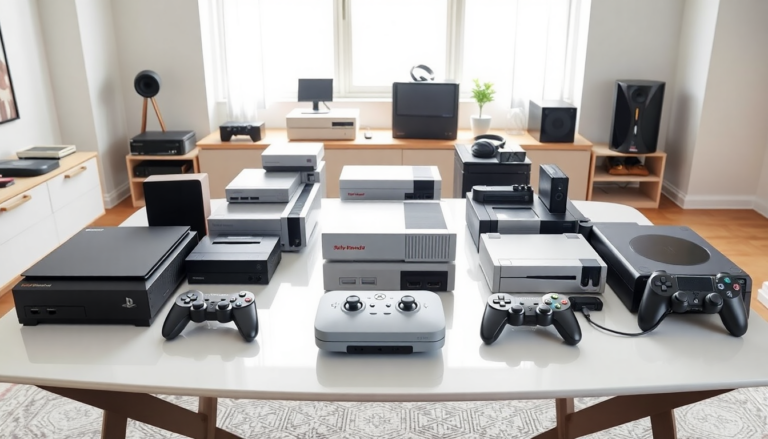Argomenti trattati
Video game consoles have revolutionized the way we experience gaming, offering a unique blend of technology and entertainment. From the very first home consoles to the latest virtual reality systems, these devices have evolved drastically, shaping the gaming landscape we enjoy today. Whether you’re a casual player or a hardcore enthusiast, understanding the different types of consoles and their features can enhance your gaming experience.
The evolution of video game consoles
The journey of video game consoles began in the early 1970s with the Magnavox Odyssey, a pioneer in home gaming. This console set the stage for future developments, although it was quite rudimentary by today’s standards. The real growth began in the late 1970s and 1980s with the introduction of more sophisticated systems like the Atari 2600, which captured the imagination of gamers worldwide. With advancements in technology, consoles became more powerful, allowing for better graphics and more complex gameplay.
As we moved into the 1990s, companies like Sony and Nintendo emerged as major players, each introducing iconic consoles like the PlayStation and the Nintendo 64. These systems not only provided improved graphics but also introduced memorable franchises that are still beloved today. Fast forward to the 2000s and beyond, where we see the rise of online gaming and the introduction of motion-sensing technology, further enhancing the gaming experience.
Types of video game consoles
When it comes to video game consoles, there are several types to consider, each catering to different gaming preferences. The most common are home consoles, which connect to your television and typically come with handheld controllers. These are designed for multiplayer experiences and immersive gameplay. Some of the most popular home consoles today include the PlayStation 5, Xbox Series X, and Nintendo Switch.
On the other hand, handheld consoles have carved out their niche in the gaming world. Devices like the Nintendo Game Boy and the more recent Nintendo Switch Lite allow players to enjoy gaming on the go. These portable consoles pack a punch in terms of gameplay and graphics, making them perfect for those who want to game while commuting or traveling.
The rise of virtual reality
Virtual reality (VR) has taken the gaming industry by storm, offering an immersive experience that traditional consoles cannot match. VR headsets like the Oculus Quest 2 provide players with a fully interactive environment, allowing them to step into their favorite games. The technology behind VR is constantly evolving, with improvements in graphics and motion tracking making the experience even more lifelike.
Many VR systems require a connection to a powerful gaming PC or console, but standalone devices have emerged, making VR more accessible. These advancements mean that gamers can enjoy a range of experiences, from fast-paced action games to serene exploration adventures in a virtual space.
Dedicated consoles and their impact
Dedicated consoles are another interesting aspect of the gaming ecosystem. Unlike versatile devices, these consoles come pre-loaded with games and are specifically designed for gaming. They cater to a specific audience, often focusing on nostalgia or unique gaming experiences. Examples include the Sega Genesis Mini or the Nintendo Classic Mini, which allow players to relive the glory days of gaming without the need for additional purchases or downloads.
While dedicated consoles may seem limited in scope, they play a crucial role in preserving gaming history and providing new generations with access to classic titles. They serve as a bridge between past and present, reminding us of the evolution of gaming over the decades.
The future of gaming consoles
As technology continues to advance, the future of gaming consoles looks promising. With trends pointing towards cloud gaming and increased integration of AI, we can expect consoles to become even more powerful and user-friendly. Imagine a world where you can access any game from the cloud, without the need for physical hardware. This shift could redefine how we approach gaming, making it more accessible and versatile than ever before.
Moreover, as the gaming community grows, so does the focus on inclusivity and accessibility. Future consoles may offer innovative features that cater to a wider audience, ensuring that gaming is a space for everyone, regardless of ability or experience level. The convergence of technology and gaming culture will undoubtedly lead to exciting developments in the years to come.

